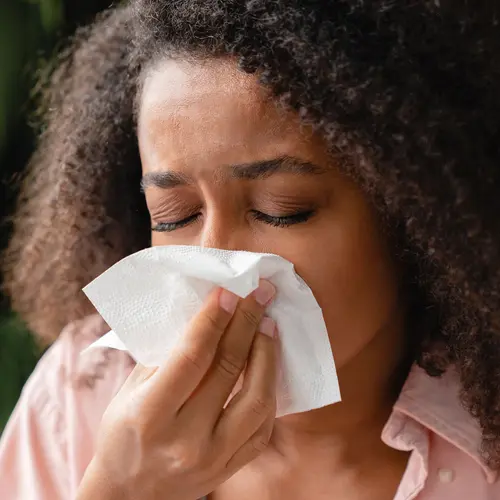If you’re allergic to pollen, you may get a break when the weather gets cold. But if you have indoor allergies such as mold and dust mites, you may notice your allergy symptoms more during winter, when you spend more time inside.
Causes
When it gets cold and your furnace kicks on, it sends dust, mold spores, and insect parts into the air. They can get into your nose and launch a reaction.
Some common indoor allergy triggers are:
- Dust mites. These microscopic bugs flourish in mattresses and bedding. When their droppings and remains become airborne, they can cause allergy symptoms.
- Mold. This fungus thrives in damp, humid areas such as basements and bathrooms. When mold spores get into the air, they can trigger allergy symptoms.
- Animals. Most people are not allergic to animal fur, but rather to a protein found in the pet dander, saliva, and urine.
Symptoms
Allergy symptoms caused by dust, pollen, or mold include:
How can you tell whether your symptoms are from a cold, the flu, or allergies? Allergies make you itchy or have a tickle in your throat. You'll want to rub your eyes, or your nose. Cold and flu don't cause itching. Colds don't tend to have a fever, but flu does--also body aches in flu.
A cold usually doesn't last for more than 10 days. Allergies can linger for weeks or even months. Also, colds and flu sometimes have a fever and aches and pains, which don’t usually happen with allergies.
Diagnosis
If your symptoms last more than a week, see your doctor. They will usually start you on allergy medications. If they don't help, and symptoms continue, they may refer you to an allergist for additional testing.
The allergist may do a skin test where they scratch your skin with a tiny bit of an allergen or injects it just under your skin. If the area turns red and itchy, you're allergic. There's also a blood test to diagnose some allergies.
Treatment
Treatments for winter allergies include:
- Antihistamines, which reduce sneezing, sniffling, and itching
- Decongestants, which clear mucus to relieve congestion and swelling
- Immunotherapy (allergy shots or under-the-tongue tablets), which expose your body to gradually bigger doses of the allergen. This approach can curb your symptoms for a longer period of time than allergy drugs.
Prevention
You can’t prevent an allergy. But if you know you’re allergic, you can take steps to avoid a reaction. Use these tips:
- Throw out shower curtains, wallpaper, and carpeting that have mold.
- Wash showers and sinks with a solution containing 5% bleach and a little detergent.
- To help control dust mites and mold, use a dehumidifier to keep the humidity in your home below 50%.
- Use a HEPA air filter to clean dust from the air.
- Wash bedding in hot water (130 F) each week.
- Use allergy-proof covers on mattresses, pillows, and comforters.
If someone in your household is allergic to pet dander and you really want a pet, the best choices are animals without fur, such as fish. If you already have a cat or dog, don't let it sleep in your bedroom, and give it a bath at least once a week.
Also, during the winter holidays:
- Consider an artificial Christmas tree. Live ones can have chemicals and mold on them.
- Wash the dust off the ornaments before you hang them.
- Buy glass or plastic ornaments rather than fabric, which can collect more dust.
- Don’t put wood in the fireplace until you’re ready to burn it, so pollen and mold stay outside.
If you have a pet allergy and you’ll be visiting people who have cats or dogs, take your allergy medication with you and keep up with your immunotherapy before you go. Bring your own pillow with you, too.

